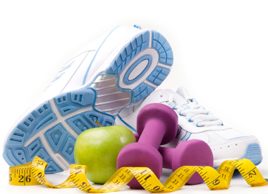
It’s a lifestyle change
You’ve probably heard it before, but committing to a get-healthy fitness and eating plan really is a lifestyle adjustment. It’s important to make sure both your mind and body are on the same track. For inspiration and a little extra motivation, here’s what some of the experts recommend.

Kitchen clean-out
A kitchen clean-out is a great way to start fresh by replacing tempting sugary and fatty foods with healthier options, says nutrition science and communications expert Lucia Weiler.
Here’s what she recommends you stock up on, and which foods you should get rid of:
Keep: fresh fruit and veggies, whole grains, lower fat milk, cheese and yogurt and proteins such as nuts and seeds, nut butter, canned fish and beans
Toss: any expired food, cookies, chips, cheesies and salty, fatty meats

Stick to your fitness plan
Being unprepared and not planning ahead is a common reason people don’t meet their fitness goals, says Louise Green, a certified personal trainer and wellness coach.
Before you’re ready to commit, she recommends considering the following points:
• Do you have the gear?
• Ladies, invest in a good sports bra!
• How do you plan to hydrate yourself?
• Do you have support?
• Find out what physical activities you enjoy.
• Have you scheduled time for your fitness?
• Know what your goals are.

Healthy shopping
With no many options to choose from at the grocery store, it can be overwhelming when shopping for nutritious foods. Here are four tips from nutrition expert Lucia Weiler to help you save time while still getting what you need:
• Look for signs of quality and freshness
• Plan your meals for the week before you go shopping so you know what ingredients you’ll need
• Organize your shopping list. You’ll find most fresh foods around the perimeter of the grocery store, while canned goods and non-perishables will be in centre aisles.
• Eat something healthy before you head to the grocery store. If you’re hungry while you’re shopping, you’re more likely to pick unhealthy options that you’re craving in the moment.

Know where you’re starting from
Before you begin a fitness regime, your doctor, trainer or gym may recommend you first undergo a series of physiological testing and screenings, says sports expert and co-founder of Sports Performance Centre Ltd., Colin Berenhaut.
Orthopaedic screens are used to ensure you are medically fit to participate in physical activity and not at risk for cardiovascular issues that are associated with physical exertion, he says.
While orthopaedic screening will help detect whether there are any areas of your body at risk for injury, Berenhaut says baseline fitness testing will analyze your current level of physical fitness so that a trainer or coach can provide an appropriate starting intensity.

Avoid common fitness pitfalls
Stay positive throughout your fitness experience, and you’re more likely to achieve success, says wellness expert Louise Green. Here are some common fitness pitfalls the certified personal trainer recommends you avoid:
• Doing too much, too fast
• Setting unrealistic goals – “Many people start out too lofty and then cannot achieve what they set out to do,” she says. “Small changes add up quickly so make your goals attainable and small to start.”
• Not warming up or stretching
• Underestimating the importance of rest
• Not understanding the realities – “3,500 calories equal one pound of fat, which means in order to lose one pound per week, you either need to expend 500 calories (extra) per day or consume 500 calories less,” says Green.
Related:
• Summer Slim-Down: 8 weeks to a healthier you
• Summer Slim-Down meal plan: Week 1
• Summer Slim-Down workout plan: Week 1
